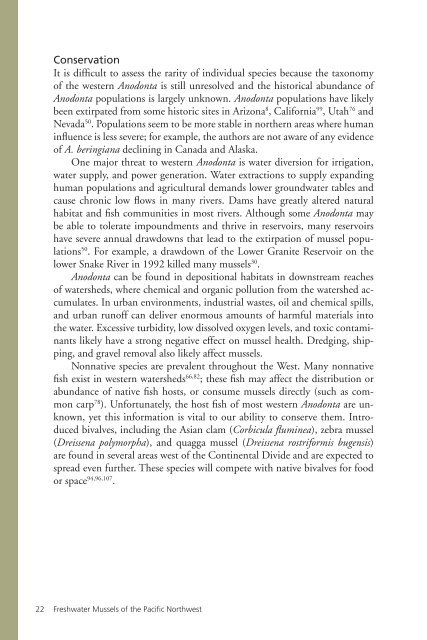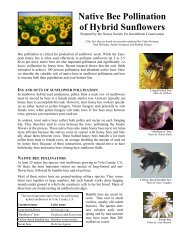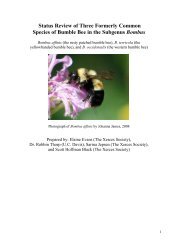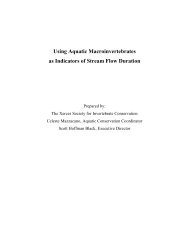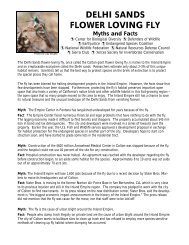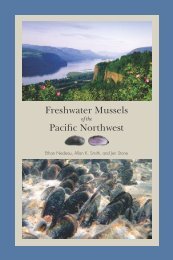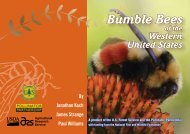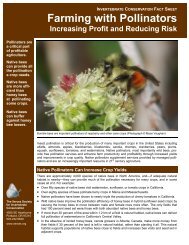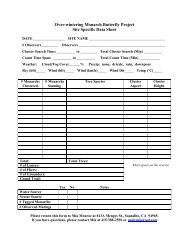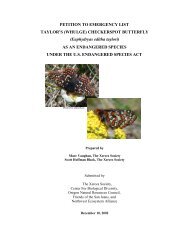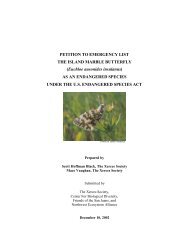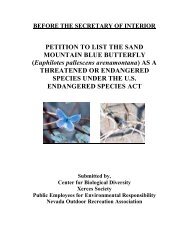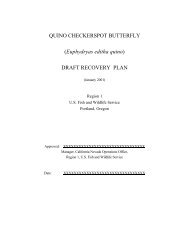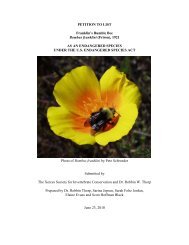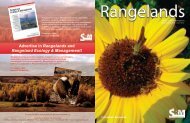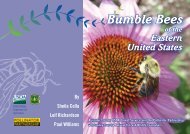Freshwater Mussels Pacific Northwest - The Xerces Society
Freshwater Mussels Pacific Northwest - The Xerces Society
Freshwater Mussels Pacific Northwest - The Xerces Society
Create successful ePaper yourself
Turn your PDF publications into a flip-book with our unique Google optimized e-Paper software.
22<br />
Conservation<br />
It is difficult to assess the rarity of individual species because the taxonomy<br />
of the western Anodonta is still unresolved and the historical abundance of<br />
Anodonta populations is largely unknown. Anodonta populations have likely<br />
been extirpated from some historic sites in Arizona 8 , California 99 , Utah 76 and<br />
Nevada 50 . Populations seem to be more stable in northern areas where human<br />
influence is less severe; for example, the authors are not aware of any evidence<br />
of A. beringiana declining in Canada and Alaska.<br />
One major threat to western Anodonta is water diversion for irrigation,<br />
water supply, and power generation. Water extractions to supply expanding<br />
human populations and agricultural demands lower groundwater tables and<br />
cause chronic low flows in many rivers. Dams have greatly altered natural<br />
habitat and fish communities in most rivers. Although some Anodonta may<br />
be able to tolerate impoundments and thrive in reservoirs, many reservoirs<br />
have severe annual drawdowns that lead to the extirpation of mussel populations<br />
50 . For example, a drawdown of the Lower Granite Reservoir on the<br />
lower Snake River in 1992 killed many mussels 30 .<br />
Anodonta can be found in depositional habitats in downstream reaches<br />
of watersheds, where chemical and organic pollution from the watershed accumulates.<br />
In urban environments, industrial wastes, oil and chemical spills,<br />
and urban runoff can deliver enormous amounts of harmful materials into<br />
the water. Excessive turbidity, low dissolved oxygen levels, and toxic contaminants<br />
likely have a strong negative effect on mussel health. Dredging, shipping,<br />
and gravel removal also likely affect mussels.<br />
Nonnative species are prevalent throughout the West. Many nonnative<br />
fish exist in western watersheds 66,82 ; these fish may affect the distribution or<br />
abundance of native fish hosts, or consume mussels directly (such as common<br />
carp 78 ). Unfortunately, the host fish of most western Anodonta are unknown,<br />
yet this information is vital to our ability to conserve them. Introduced<br />
bivalves, including the Asian clam (Corbicula fluminea), zebra mussel<br />
(Dreissena polymorpha), and quagga mussel (Dreissena rostriformis bugensis)<br />
are found in several areas west of the Continental Divide and are expected to<br />
spread even further. <strong>The</strong>se species will compete with native bivalves for food<br />
or space 94,96,107 .<br />
<strong>Freshwater</strong> <strong>Mussels</strong> of the <strong>Pacific</strong> <strong>Northwest</strong>


